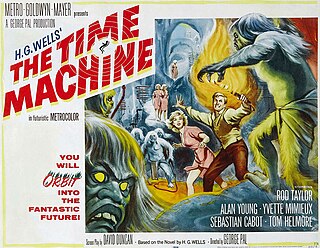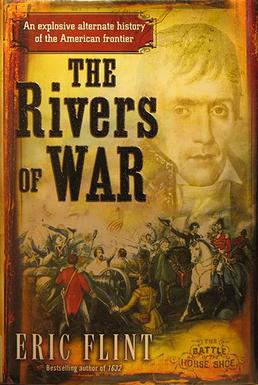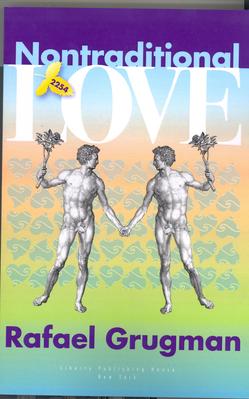
Alternate history is a subgenre of speculative fiction in which one or more historical events have occurred but are resolved differently than in actual history. As conjecture based upon historical fact, alternate history stories propose What if? scenarios about crucial events in human history, and present outcomes very different from the historical record. Some alternate histories are considered a subgenre of science fiction, or historical fiction.

Cyberpunk is a subgenre of science fiction in a dystopian futuristic setting that tends to focus on a "combination of lowlife and high tech", featuring futuristic technological and scientific achievements, such as artificial intelligence and cyberware, juxtaposed with societal collapse, dystopia or decay. Much of cyberpunk is rooted in the New Wave science fiction movement of the 1960s and 1970s, when writers like Philip K. Dick, Michael Moorcock, Roger Zelazny, John Brunner, J. G. Ballard, Philip José Farmer and Harlan Ellison examined the impact of drug culture, technology, and the sexual revolution while avoiding the utopian tendencies of earlier science fiction.
Feminist science fiction is a subgenre of science fiction focused on such feminist themes as: gender inequality, sexuality, race, economics, reproduction, and environment. Feminist SF is political because of its tendency to critique the dominant culture. Some of the most notable feminist science fiction works have illustrated these themes using utopias to explore a society in which gender differences or gender power imbalances do not exist, or dystopias to explore worlds in which gender inequalities are intensified, thus asserting a need for feminist work to continue.
Science fiction and fantasy serve as important vehicles for feminist thought, particularly as bridges between theory and practice. No other genres so actively invite representations of the ultimate goals of feminism: worlds free of sexism, worlds in which women's contributions are recognized and valued, worlds that explore the diversity of women's desire and sexuality, and worlds that move beyond gender.
A utopia typically describes an imaginary community or society that possesses highly desirable or near-perfect qualities for its members. It was coined by Sir Thomas More for his 1516 book Utopia, which describes a fictional island society in the New World.

The Dispossessed is a 1974 utopian science fiction novel by American writer Ursula K. Le Guin, one of her seven Hainish Cycle novels. It is one of a small number of books to win all three Hugo, Locus and Nebula Awards for Best Novel. It achieved a degree of literary recognition unusual for science fiction due to its exploration of themes such as anarchism and revolutionary societies, capitalism, utopia, individualism, and collectivism.

Harry Norman Turtledove is an American author who is best known for his work in the genres of alternate history, historical fiction, fantasy, science fiction, and mystery fiction. He is a student of history and completed his PhD in Byzantine history. His dissertation was on the period 565–582. He lives in Southern California.
Utopian and dystopian fiction are subgenres of speculative fiction that explore social and political structures. Utopian fiction portrays a setting that agrees with the author's ethos, having various attributes of another reality intended to appeal to readers. Dystopian fiction offers the opposite: the portrayal of a setting that completely disagrees with the author's ethos. Some novels combine both genres, often as a metaphor for the different directions humanity can take depending on its choices, ending up with one of two possible futures. Both utopias and dystopias are commonly found in science fiction and other types of speculative fiction.

Agent of Byzantium is a 1987 collection of short stories by Harry Turtledove, centered on the exploits of Basil Argyros, a Byzantine secret agent. The stories are set in an alternate 14th century, where Islam never existed and the great ancient empires of Byzantium and Sassanid Persia survive.

Time travel is a common theme in fiction, mainly since the late 19th century, and has been depicted in a variety of media, such as literature, television, film, and advertisements.

The literary genre of science fiction is diverse, and its exact definition remains a contested question among both scholars and devotees. This lack of consensus is reflected in debates about the genre's history, particularly over determining its exact origins. There are two broad camps of thought, one that identifies the genre's roots in early fantastical works such as the Sumerian Epic of Gilgamesh. A second approach argues that science fiction only became possible sometime between the 17th and early 19th centuries, following the scientific revolution and major discoveries in astronomy, physics, and mathematics.

A Modern Utopia is a 1905 novel by H. G. Wells.

1812: The Rivers of War is a 2005 alternate history novel by American writer Eric Flint.
The non-fiction novel is a literary genre that, broadly speaking, depicts non-fictional elements, such as real historical figures and actual events, woven together with fictitious conversations and uses the storytelling techniques of fiction. The non-fiction novel is an otherwise loosely defined and flexible genre. The genre is sometimes referred to using the slang term "faction", a portmanteau of the words fact and fiction.
"The Lincoln Train" is an alternate history short story published by Maureen F. McHugh, published in April 1995. It is collected in volume 31 of the Nebula Awards anthologies, in Alternate Tyrants (1997), and in Best of the Best: 20 Years of the Year's Best Science Fiction (2005).
Uchronia: The Alternate History List is an online general-interest book database containing a bibliography of alternate history novels, stories, essays and other printed material. It is owned and operated by Robert B. Schmunk. Uchronia was twice selected as the Sci Fi Channel's "Sci Fi Site of the Week."

A dystopia, also called a cacotopia or anti-utopia, is a community or society that is extremely bad or frightening. It is often treated as an antonym of utopia, a term that was coined by Sir Thomas More and figures as the title of his best known work, published in 1516, which created a blueprint for an ideal society with minimal crime, violence, and poverty. The relationship between utopia and dystopia is in actuality, not one simple opposition, as many utopian elements and components are found in dystopias as well, and vice versa.

Nontraditional Love is a dystopian novel written by the Russian writer Rafael Grugman and describes an alternative future where heterosexuality is outlawed. The novel was first published by Liberty Publishing House in November 2008 and nominated for the 2009 Rossica Translation Prize. Nontraditional Love combines satire with Orwellian themes for a unique look at morals and society.
Phillip E. Wegner is a professor in the Department of English and the Marston-Milbauer Eminent Scholar in English at the University of Florida.
"Liberating Alaska" is an alternate history short story by Harry Turtledove, published in the July/August 2018 issue of the Isaac Asimov's Science Fiction Magazine.










